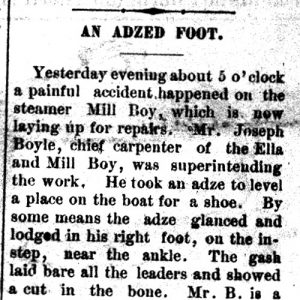calsfoundation@cals.org
Mill Boy [Steamboat]
The Mill Boy was a small commercial steamboat that served as a portable grist mill and was later put in the service of the Union army during the Civil War.
The Mill Boy was an eighty-six-ton sidewheel paddle boat constructed on the Monongahela River in 1857 at Chambersburg, Ohio, by Captain Josiah Cornwall, who equipped the vessel as a floating grist mill and general store. The Mill Boy was initially powered by horses pacing on treadmills attached to the sidewheels, but in 1860 a boiler and small engine were added. Cornwall sold the vessel to other investors at about the time the Civil War began.
On December 17, 1862, the Mill Boy, then under the command of Captain L. C. Vale, was contracted to steam from Memphis, Tennessee, to Commerce, Mississippi, to pick up a load of cotton. The vessel was told to wait after arriving there so that the cotton could be transported from inland for shipment; the captain kept the steam up while the Mill Boy waited. At around dark, a group of guerrillas identified as Blythe’s cavalry, who had been attacking shipping on the Mississippi River, opened fire, killing one man and mortally wounding another as a third leaped into the river and drowned as the steamboat backed into the main current.
The Mill Boy steamed to Helena (Phillips County) and reported the incident. The gunboat USS Juliet and the transport City Belle, with a detachment from the Eleventh and Forty-seventh Indiana Infantry Regiments, were immediately sent to Commerce, where they burned the town to the ground and put every plantation within five miles to the torch. The Mill Boy was equipped with a cannon after this incident.
The Mill Boy was chartered by the U.S. Army’s Quartermaster Corps in January 1863 for use as a troop and supply transport and then pressed into government service after that, still operating from Memphis.
Captain James H. McGhee’s irregular Confederate cavalrymen were operating along the Arkansas side of the Mississippi in January and February 1863, attacking and burning several boats in Union service. On February 21, Major General Stephen Hurlbut, convinced that McGhee was sheltering in the town of Hopefield (Crittenden County), ordered the Mill Boy, escorted by the gunboat USS Cricket, to transport several companies of the Sixty-third Illinois Infantry Regiment across the river from Memphis to burn Hopefield to the ground. The Mill Boy then transported displaced civilians across the river.
By early 1864, the Mill Boy was operating on the White River in Arkansas, and on January 31 the vessel, loaded with thirty-five tons of supplies, was heading upriver to supply the Union garrison at Batesville (Independence County) when a violent storm arose. The steamboat was tied to the shore—Colonel Robert R. Livingston alleged “with a half rotten cable of hemp”—and the fire to its boilers was extinguished to avoid the danger of the vessel catching fire. During the night, the cable broke, and Mill Boy drifted down the river, where it hit a snag and sank.
Captain J. C. Potts of the First Nebraska Cavalry led a thirty-man detachment from Batesville the next day to salvage what they could from the wreck of the Mill Boy, succeeding in removing the cannon tube and getting “everything off that was possible with a small skiff.”
What remained of the Mill Boy continued to drift downstream and eventually approached the Union base at DeValls Bluff (Prairie County), where it struck the steamboat H. A. Homeyer, “then unloading, punching a hole in her amidships.…The wreck then floated on, and when last heard of, had floated out of the river, bottom upward.” The U.S. government paid the Mill Boy’s owners $11,604.59 for the vessel’s loss.
For additional information:
Boatright, Neva J. “A Study of the Mill Boy.” Grand Prairie Historical Society Bulletin 51 (April 2011): 2–5.
“From Cairo and Below.” St. Louis Globe-Democrat, February 16, 1864, p. 1.
Gibson, Charles Dana and E. Kay Gibson, comps. Dictionary of Transports and Combatant Vessels Steam and Sail Employed by the Union Army 1861–1868. Camden, ME: Ensing Press, 1995.
“More Yankee Villainy!” Fayetteville Semi-Weekly Observer [North Carolina], March 23, 1863, p. 2.
“The Partisans at Work on the River.” Memphis Daily Appeal, December 27, 1862, p. 2.
Tipton, J. Brent. “A Study of the ‘Mill Boy.’” Independence County Chronicle 51 (July 2010): 19–24.
———. “Union Steamer Transport ‘Mill Boy.’” Stream of History 52 (November–December 2019): 17–20.
“The War in Tennessee.” Baltimore Sun, December 23, 1862, p. 1, col. 4.
Way, Frederick, Jr. Way’s Packet Directory. Athens: University of Ohio Press, 1983.
Mark K. Christ
Central Arkansas Library System


 Mill Boy Article
Mill Boy Article 



Comments
No comments on this entry yet.